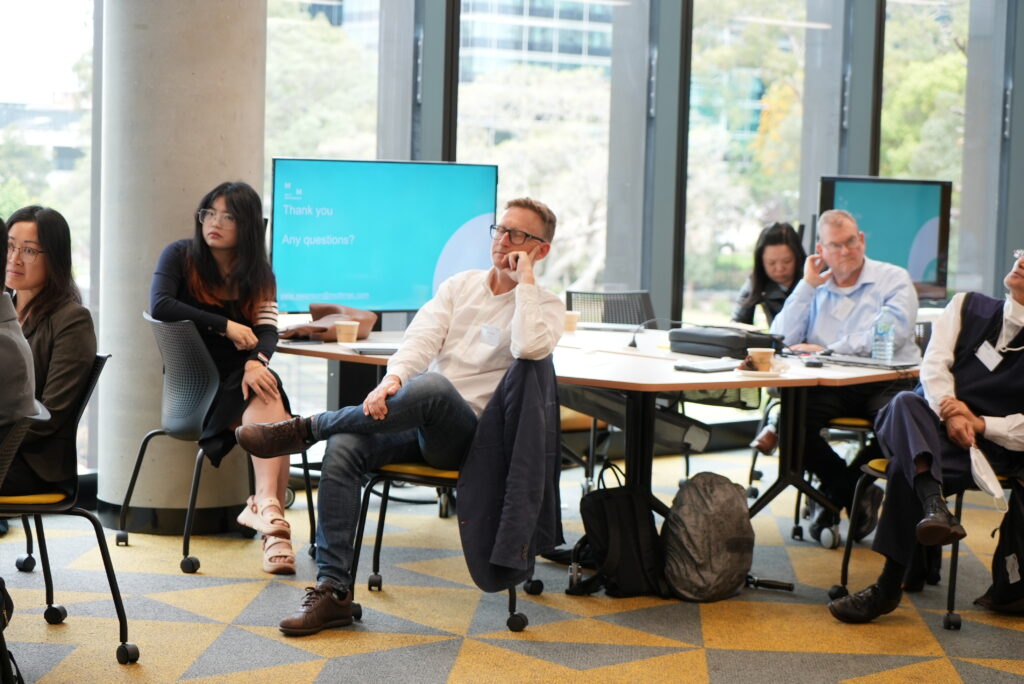Event date: October 18, 2024
The Decarbonising Construction Project Delivery through Digitalisation workshop, held at Western Sydney University, was an insightful event that convened leaders from government, industry, and academia. This gathering highlighted the critical role of digital technologies in reducing carbon emissions in the construction sector. With speakers from organisations such as Transport for New South Wales, CPB Contractors, Mott MacDonald, WSP, and ABAB, the event showcased best practices and real-world applications where digitalisation supports decarbonisation goals. A key highlight was the interactive roundtable discussion where participants delved into the industry’s top decarbonisation challenges, proposing how innovative digital solutions could address these pressing issues.

Presentations
The DBI-WSU Workshop brought together experts who showcased innovative digital solutions to decarbonise construction project delivery. Dr. Behzad Rismanchi introduced the DBI Network’s collaborative mission to connect academia, industry, and government for sustainable innovation. Jun Wang highlighted “MetaBIM,” a framework that integrates carbon tracking with Building Information Modeling (BIM) for lifecycle carbon management. David Kelly of Transport for NSW presented a “carbon cost library” to standardise carbon tracking in infrastructure projects, while Brett Buhagiar from WSP demonstrated a Steel Reuse Tool that enables the reclamation of steel, significantly reducing material and carbon costs. Pete Swanson of Mott MacDonald addressed the hidden carbon costs of digital infrastructure, advocating for lifecycle planning to reduce the environmental footprint of technology systems. Joseph Caparotta of webuild provided a contractor’s perspective, emphasising that sustainable change in construction depends on collaboration and practical, real-world applications of digital tools. Andrew Curthoys from ABAB highlighted the critical role of government in setting consistent digital standards to enable effective carbon tracking and build confidence in decarbonisation investments.

Round table discussion
The roundtable session focused on identifying and prioritising key challenges in decarbonising construction, using a ranked list of issues such as inconsistent carbon measurement methods, fragmented data, and varying regulatory standards. Participants highlighted three main priorities: the need for standardised carbon calculation methods, barriers to collaboration caused by intellectual property restrictions, and the integration of renewable energy in construction projects. Each priority was examined in terms of its urgency and digital solvability, with attendees emphasizing the role of open-source tools, data transparency, and consistent standards in overcoming these challenges and fostering industry-wide collaboration.

The DBI-WSU Workshop underscored that digital technologies are indispensable to advancing decarbonisation in construction. By integrating carbon management with digital project tools and frameworks like BIM, industry leaders and researchers can provide the data-backed insights needed to make sustainable design and construction choices. Presentations from government, industry, and academic representatives showcased emerging best practices and highlighted the progress made toward a carbon-neutral future. The collaborative roundtable session emphasized the value of shared digital tools and consistent standards, as these are critical to addressing the complexities of sustainable construction.
This workshop has set the stage for continued dialogue and collaboration, aligning stakeholders with a shared vision for a sustainable, digitally enabled construction industry. As these discussions evolve, future workshops promise to build on these foundations, ensuring that digital tools are effectively harnessed to meet the challenges of decarbonisation.

